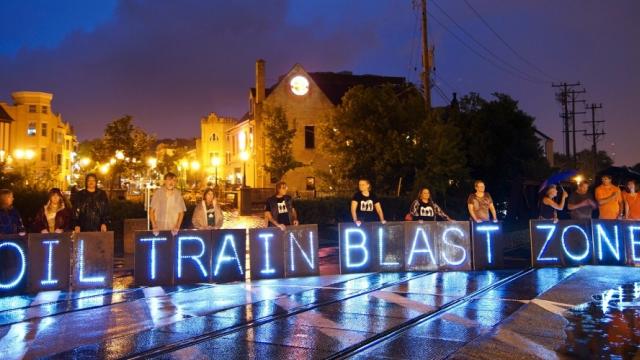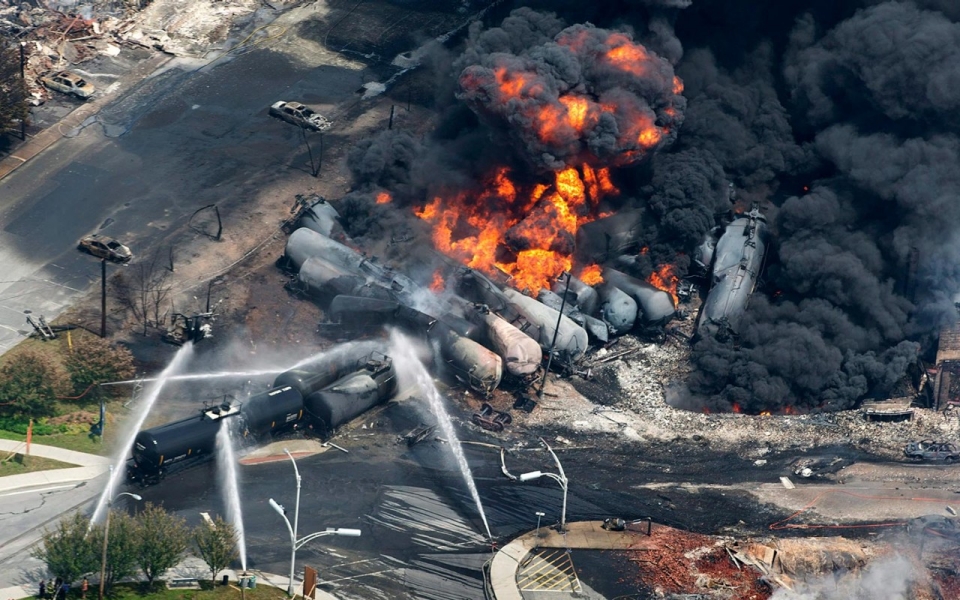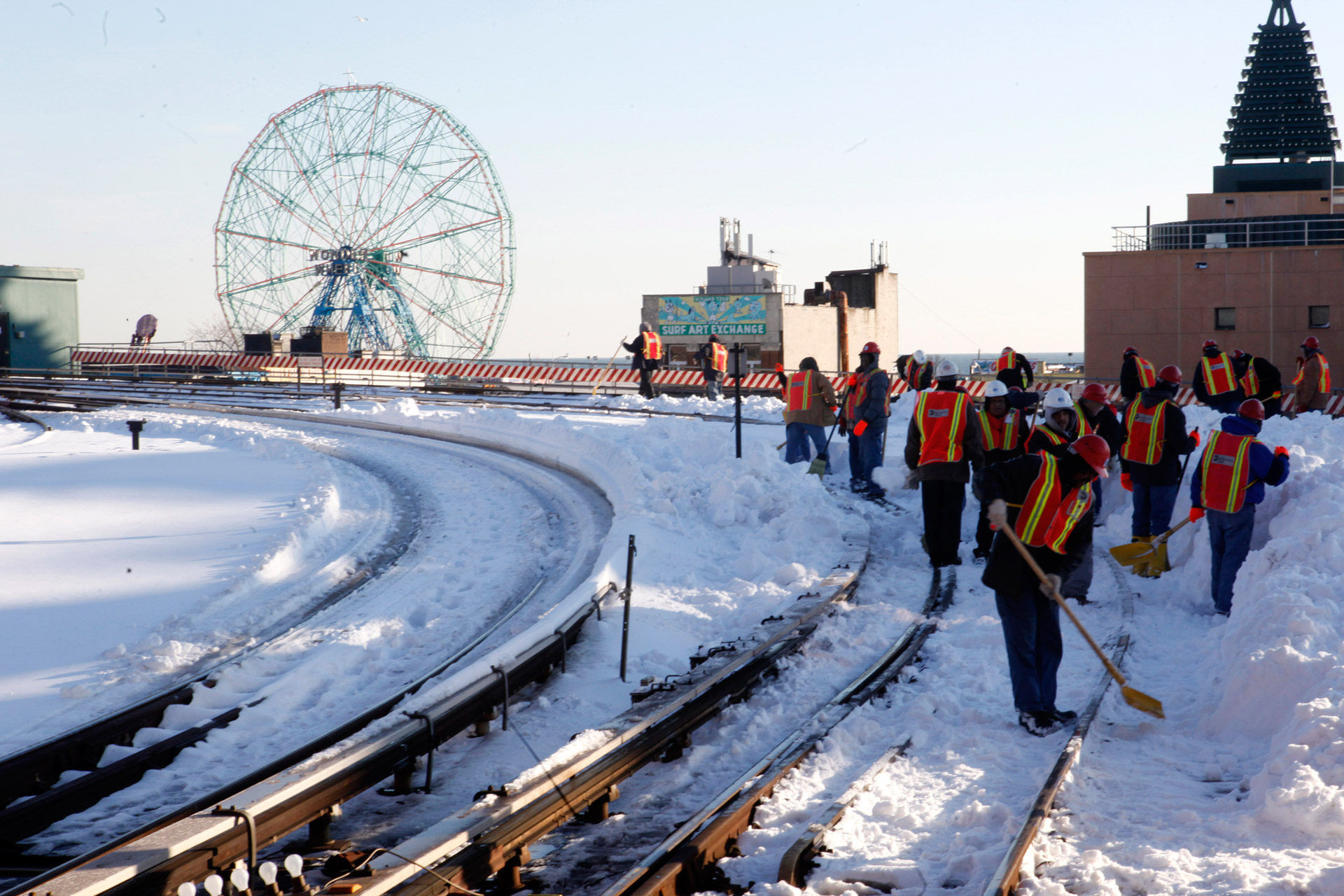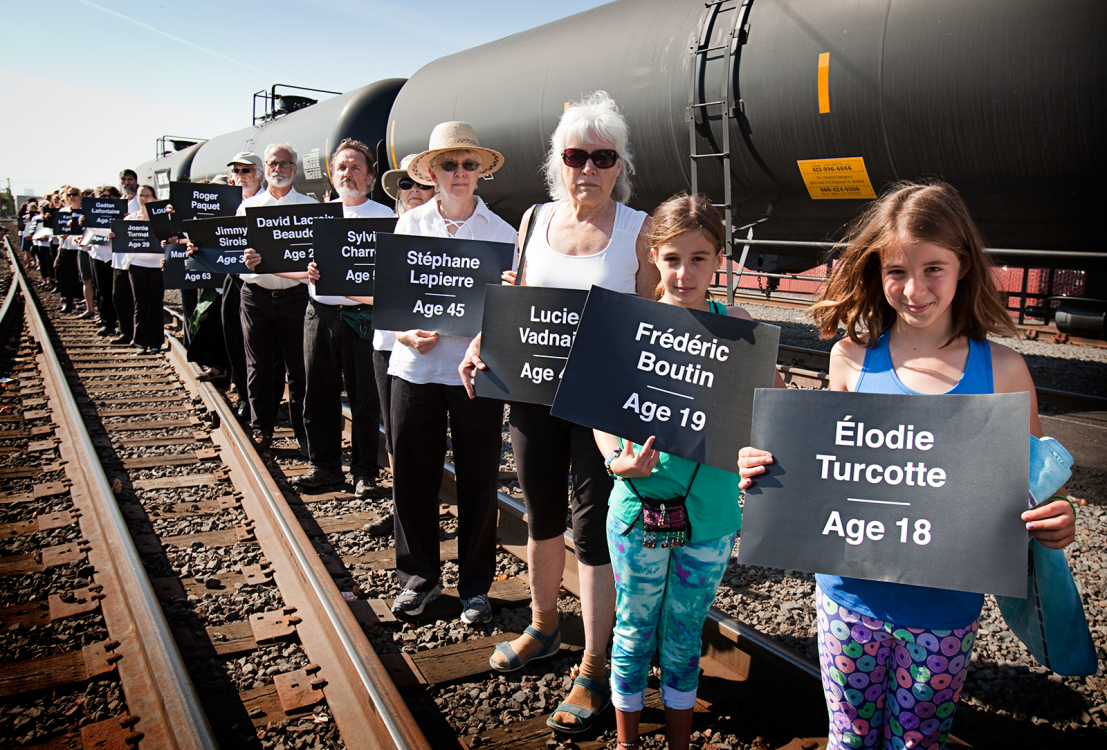
In this ongoing series, “From the Ground Up,” Occupy.com joins with Commonomics USA in presenting stories of local struggles for a new, sustainable economy. This is the second of two installments. Read the first part here.
“Bomb Trains” Full of Crude
Trains in the service of corporate consumption play a central role in our increasingly lethal carbon economy. Millions of gallons of highly flammable crude oil travel every day through cities, towns and ecologically sensitive areas, hauled by trains going way too fast. Most recently, a train loaded with crude oil derailed and burst into flames near a small town 70 miles from Portland, Ore. Soon, the Columbia River was full of oil and hundreds of residents were displaced.
There were at least six major accidents of this type last year. In the last eight years, the amount of crude oil transported by trains has grown forty-fold. In 2013, a crude oil train of the same type exploded in Quebec killing 47 people.
Citizens’ groups are fighting tooth and nail to stop this practice – trying to get the trains to slow down, to divert them from environmentally vulnerable areas, to create safer railway tanks. Since regulations on railcars are weak and take several years to implement, groups are suing railroads and governments. In 2014 and 2015, I conducted some interviews with members of Citizens Acting for Rail Safety (CARS), a Midwestern group that had been fighting against the expansion of Burlington Northern Santa Fe railroad’s crude oil transport through the biologically rich La Crosse River Wetlands in La Crosse, Wis.
“The amount of oil being transported down the Mississippi River [through Minnesota and Wisconsin] is over 500,000 barrels a day,” CARS co-founder Alan Stankevich told melast year. “That's the equivalent of an oil pipeline. And pipelines always require Environmental Impact Statements,” he said, but the trains do not. Moreover, cities and counties are often powerless to stop companies like BNSF from doing whatever they want because of ownership and statutory advantages dating back over a century. And don’t expect Scott Walker-run Wisconsin to use its Department of Natural Resources to push back against the rail companies either. The best it's offered are watered-down environmental analyses that unsurprisingly conclude that everything’s okay – even as trains full of crude oil derail and explode every couple of months.
I think of what John Paul Wright tells me about railway workers – that they’re “forced to move whatever America wants” and are “caught in the middle” of any attempt to create a sustainable future. Companies like BNSF will tell their workers, and their workers’ families, that those pesky La Crosse environmentalists want to put the railroad out of business and make all the jobs go away. The railroad is one important site of this ongoing struggle against the forced choices of crony capitalism: jobs versus the environment. But when you’re a working family teetering on the edge of financial insecurity, that terror can spark unfortunate loyalties.
Mass Transit: The Democratization of Movement
Previously I mentioned that early in the 20th century, some major automobile and oil corporations conspired to dismantle most of our nation’s electric railway systems to force cities to choose cars, highways and high levels of gas consumption instead. Big business apologists today deny there was a conspiracy, but there was a federal court case that proved it, and the defendants were found guilty. Big Auto and Big Oil also changed laws across the country to discourage both pedestrian and public transit traffic and favor cars – including making it a crime to cross the street.
Subsequently, highway construction, centered entirely on the needs of the automobile and oil industry, displaced over a million Americans during the first 20 years of the federal interstate system. Most of the displaced were low-income people of color. The demise of public transportation was part of a crime against humanity and the environment.
We have the technology and capacity to expand America’s passenger railway system and modify to be even more sustainable than it already is. To be sure, it’s already much more environmentally responsible to take a train than an airplane or car (particularly driving alone). But green technology can be retrofitted to many existing train fleets, and we could create new fleets as well.
Right now, John Paul Wright tells me, “we don’t move people because the neoliberals see no profit in a transportation policy built on service and access.” Defenders of the automobile industrial complex perpetrate all kinds of myths about the public’s lack of interest in mass transit, but even studious conservatives argue these aren't true, and they have the research to prove it. And as growing numbers of people become disenchanted with consumerism and cars, and as laws taxing carbon use begin to proliferate around the country, interest in travel by rail will grow even larger.
“Sit in Circles”
John Paul Wright is afraid that people are so divided by the system that the elites will pit railroad and energy workers against environmentalists. Like many working Americans, he knows how absolutely dug in the opposing sides are, and how likely it is that the present system is likely to hurt all sides if things – big things – don’t change quickly. “I suggest reading Black Elk Speaks, and Wendell Berry’s Unsettling of America,” he writes on his blog. “I also might suggest that changing our agriculture policy would create many opportunities and jobs. We used to own our farms. We used to ride the rails. We used to have localized economies.”
And he has a warning and call-out to those in the economic justice movement that might not think hard enough about the plight of displaced workers: We’re in this together. “In calling for a just transition, we are going to have to make sure we all sit in circles or else... we may all be running around in one.”
Matt Stannard is policy director at Commonomics USA and a member of the Public Banking Institute’s board of directors.
3 WAYS TO SHOW YOUR SUPPORT
- Log in to post comments














